I had been feeling exhausted, slogging through runs and just not feeling myself recently, and so it was suggested to me that I had some blood work done. We wanted to check my iron, haemoglobin etc, just to see if there were any deficiencies, worries or reasons for the general feeling of exhaustion that would be of concern.
Having used the NHS for blood tests in the past (particularly when my migraines were so bad, I had to have a lot of blood tests to rule out more sinister causes) however I don’t know whether my doctor would have signed off on such a large panel of bloodwork nor do I feel that it should be on the NHS to cover the costs for some of the tests that I wanted. Feeling exhausted like that given my lifestyle isn’t normal, and so I’d be happy for the iron and vit D tests, however some of the others I wanted purely in order to try to improve my running which isn’t exactly essential!
So I used MediChecks after my friend Kerry recommended them (he works at Runner’s World and has used them in many articles). I sent off for my kit which arrived the next day, and took my tubes to my local hospital to take the blood test (I’m hoping that MediChecks pay the NHS for this as I had to pay MediChecks £25 for this part of the service!) Some of their test kits just require an at-home finger prick test whilst others require a couple of vials of blood.
My test kit now ‘full’, I took it to the post-office and sent it back to MediChecks to await my results.
On the Wednesday, a week after requesting my kit, I was given the results… apparently I hadn’t filled in enough of the online paperwork about why I wanted the results to get more than a general analysis of my bloodwork though. To be honest, I hadn’t even seen that I needed to do this, and would have thought that choosing the ‘Endurance Fitness Blood Test’ would have been sort of self-explanatory but hey. Obviously I need to read the website more clearly next time.
The Test
This felt like a pretty comprehensive test, and included everything that I wanted plus many more (I’ve just taken over the Type 2 Diabetes clinic at my new job and so I was particularly keen to see what my HbA1c level was!) Despite the fact that I have to look at patient bloodwork (and have a cheat sheet for that for the wards!) I still don’t know what some of these are but they are explained within the results which is handy.
What is tested?
Hormones – Testosterone, Oestradiol, Cortisone, Thyroid hormones (Free thyroxine, TSH) Adrenal Hormones (DHEA sulphate, Cortisol)
Iron Status – Iron, Ferritin, Transferrin Saturation, UIBC, TIBC
Proteins – Globulin, Albumin, Total Protein
Liver Health – Bilirubin, ALT, ALP, GGT
Kidney Health – Creatinine, Urea, eGFR
Cholesterol – LDL, HDL, Triglycerides, Total cholesterol
Diabetes – HbA1C
Clotting Status – MPV, Platelet Count
Red Blood Cells – Heamatocrit, Haemoglobin, MCH, MCHC, MCV, RDW, Red Cell Count
White Blood Cells – White Cell Count, Basophils, Eosinophils, Lymphocytes, Monocytes, Neutrophils,
Vitamins – Vitamin D, Vitamin B12, Folate
Minerals – Magnesium, Zinc
Muscle Health – Creatine Kinase
Inflammation – CRP
The Results
I had a couple of results that were flagged of potentially worrying results and some results like slightly elevated MCH and MCHC which I’m not too concerned about! The Haemoglobin levels were 131 which is the lower end of healthy range, which I do wish was a little higher however.
MCH -> MCH (mean corpuscular haemoglobin) measures the average amount of haemoglobin contained in one of your red blood cells.
MCH is looked at in the context of your other red cell blood markers. If your other markers are normal then a slightly high MCH level may not be significant. Elevated MCH levels may be a sign of macrocytic anaemia, where the red blood cells are too large and do not contain enough haemoglobin. This is most often caused by a lack of vitamin B12 and folate (either through diet or absorption problems) which can cause MCH levels to be either high or low, indicating the need of additional tests.
MCHC -> MCHC (mean corpuscular haemoglobin concentration) is the average concentration of haemoglobin in your red blood cells. Haemoglobin is a molecule which allows red blood cells to transport oxygen around the body.
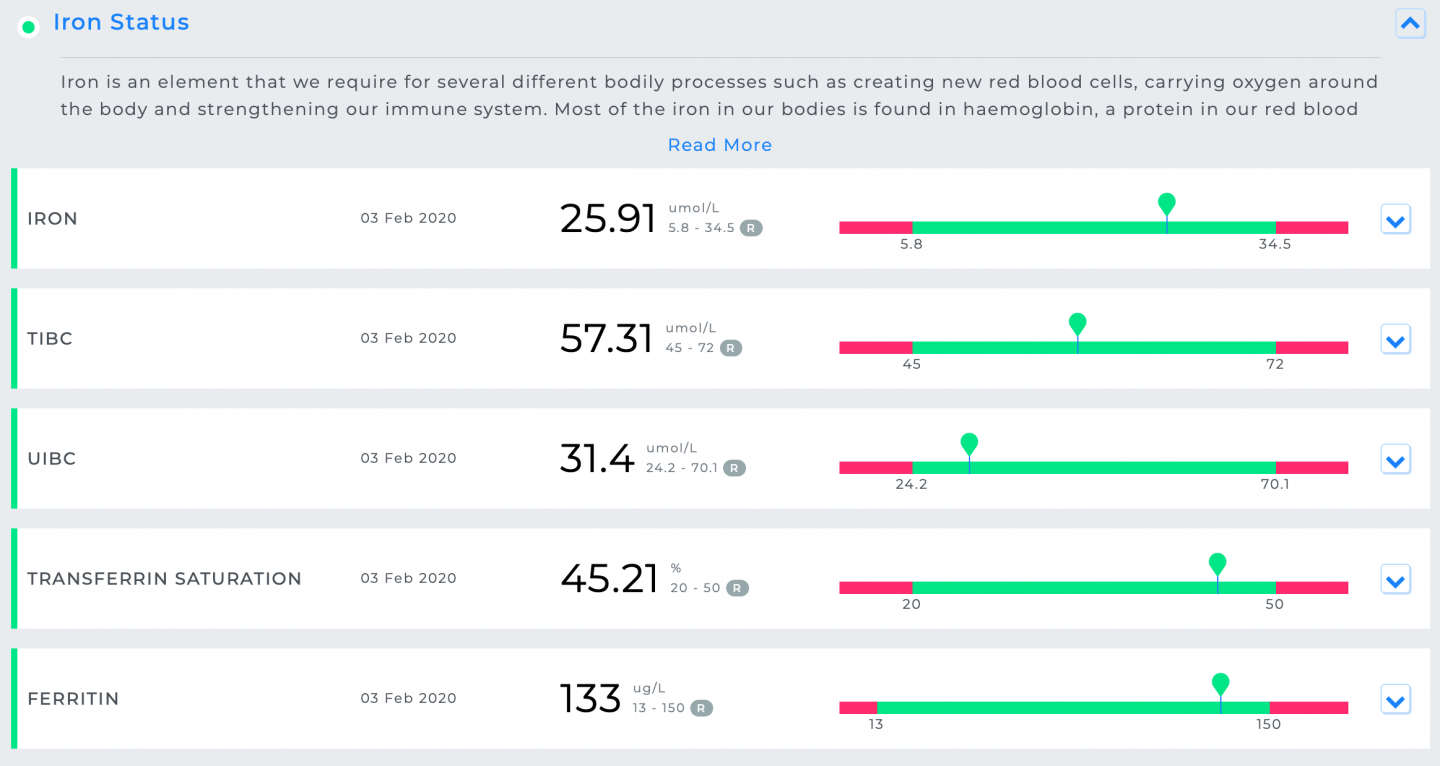
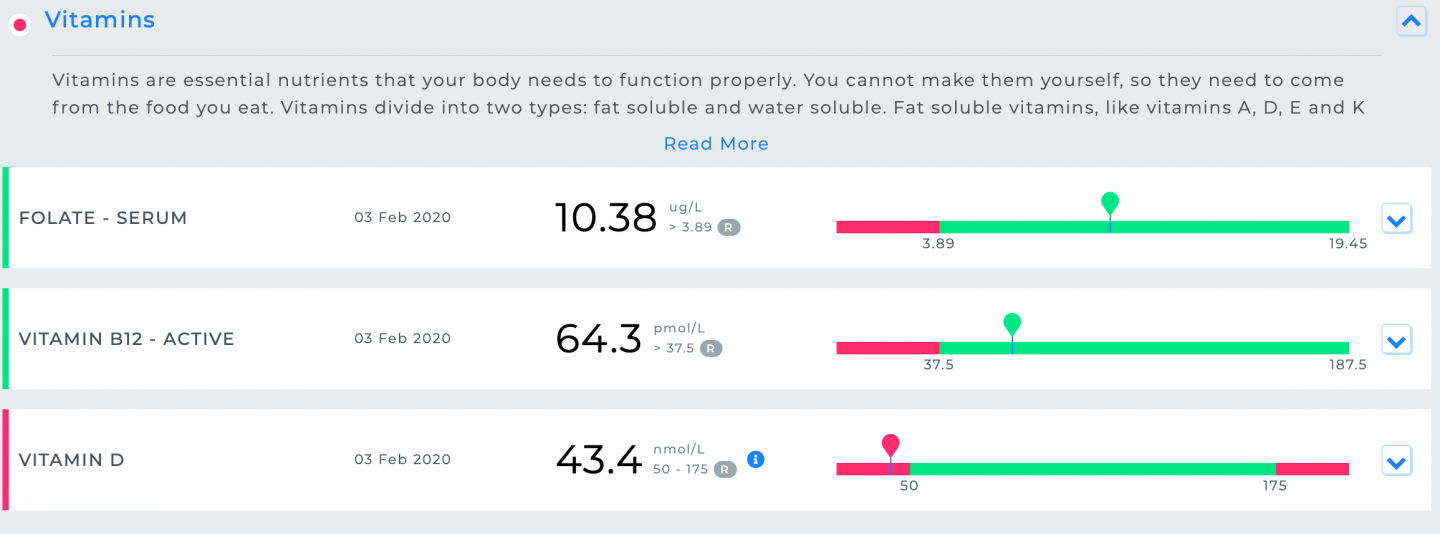
The Suggestions
There weren’t many suggestions from MediChecks in terms of improvement of performance, except to supplement 80 mcg (3200 iu) of vitamin D per day for twelve weeks. After 12 weeks decrease vitamin D supplementation to 25 mcg (1000 iu) per day.
My IG runner friend Jonathan works at Inside Tracker, a US blood testing service, and he offered to let me upload my results into their programme to see if the analysis or recommendations were any different.
Inside Tracker give you options of what you want to optimise and look at different biomarkers accordingly; Overall Health, Strength & Power, Endurance, Ageing, Stress or Injury Prevention/Recovery.
I’ve obviously chosen Endurance and working on my Haemoglobin which gave me the following suggestions;
Normally I take these suggestions (especially anything suggesting a protein supplement) with a pinch of salt…however with Manchester Marathon just 8 weeks away, I’m willing to give it a try! However, interestingly Inside Tracker didn’t pick up on my vitamin D deficiency or look at many other results/markers that I would have been keen to delve further into. Perhaps they do optimise and personalise their feedback when you have your blood tested and analysed by Inside Tracker. I’m keen to give that a go when I’m in Boston in April (where their offices are based!)
I actually took CoQ10 last year when I worked with Ubiquinol and I ran both my half and full marathon PBs while taking it religiously, so I’m definitely on board with reintroducing it into my daily routine. I stopped taking it after the Edinburgh marathon as I wasn’t training for any specific time goals and Ubiquinol is not the cheapest!
Are these tests necessary?
Overall, these tests can really rack up in price (I spent about £150 for the Medichecks test and the Inside Tracker analysis was worth $49 but kindly gifted) and unless there are things you’re concerned about, or huge goals you want to achieve with changes to make to your diet or lifestyle, then I do not think they are necessary. As I mentioned, if I had gone to the doctor to chat about my exhaustion levels, I’m sure they would have done a free basic blood test to rule out anaemia.
Have you ever had your blood tested? Would you have your blood analysed to help improve performance?

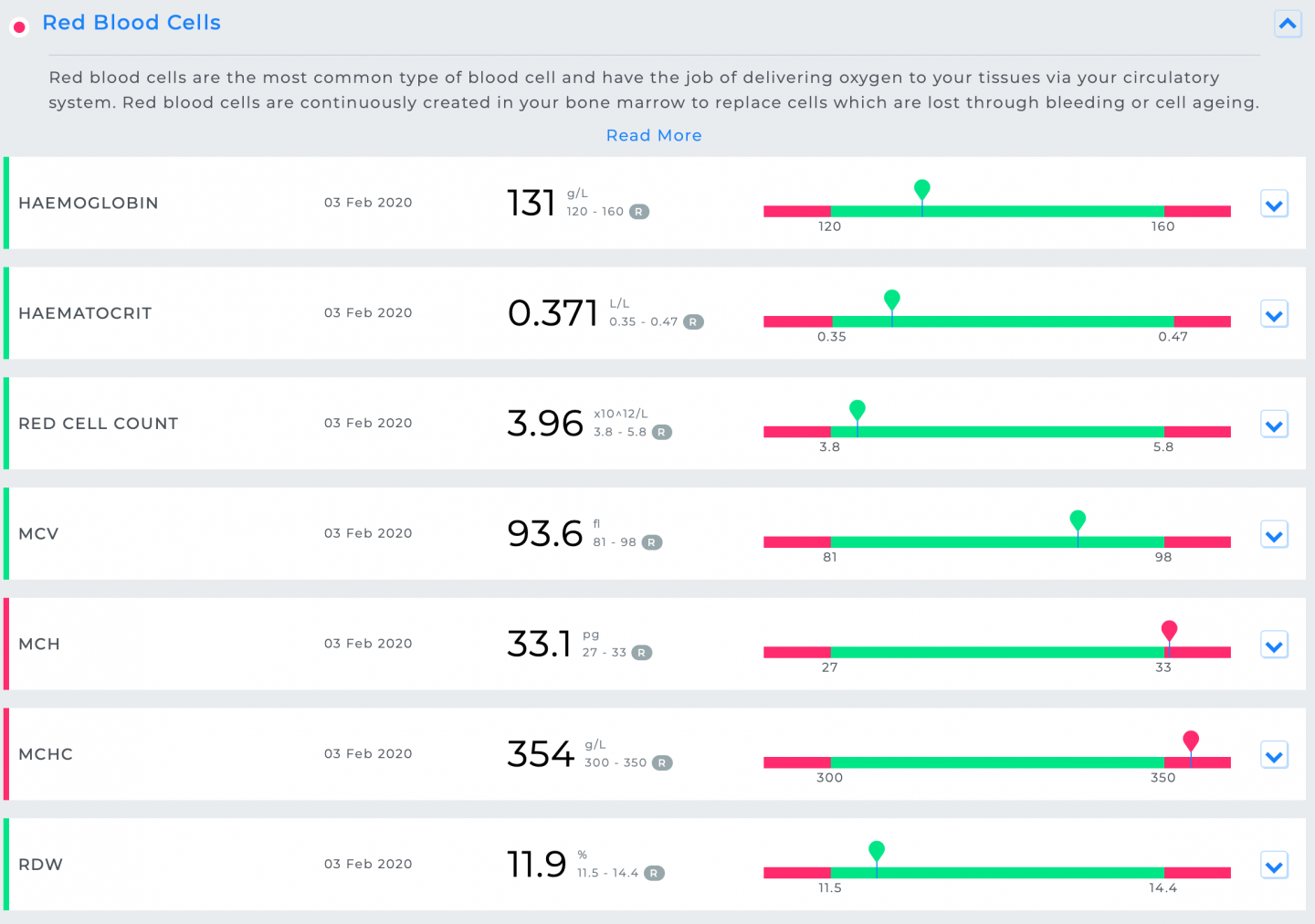
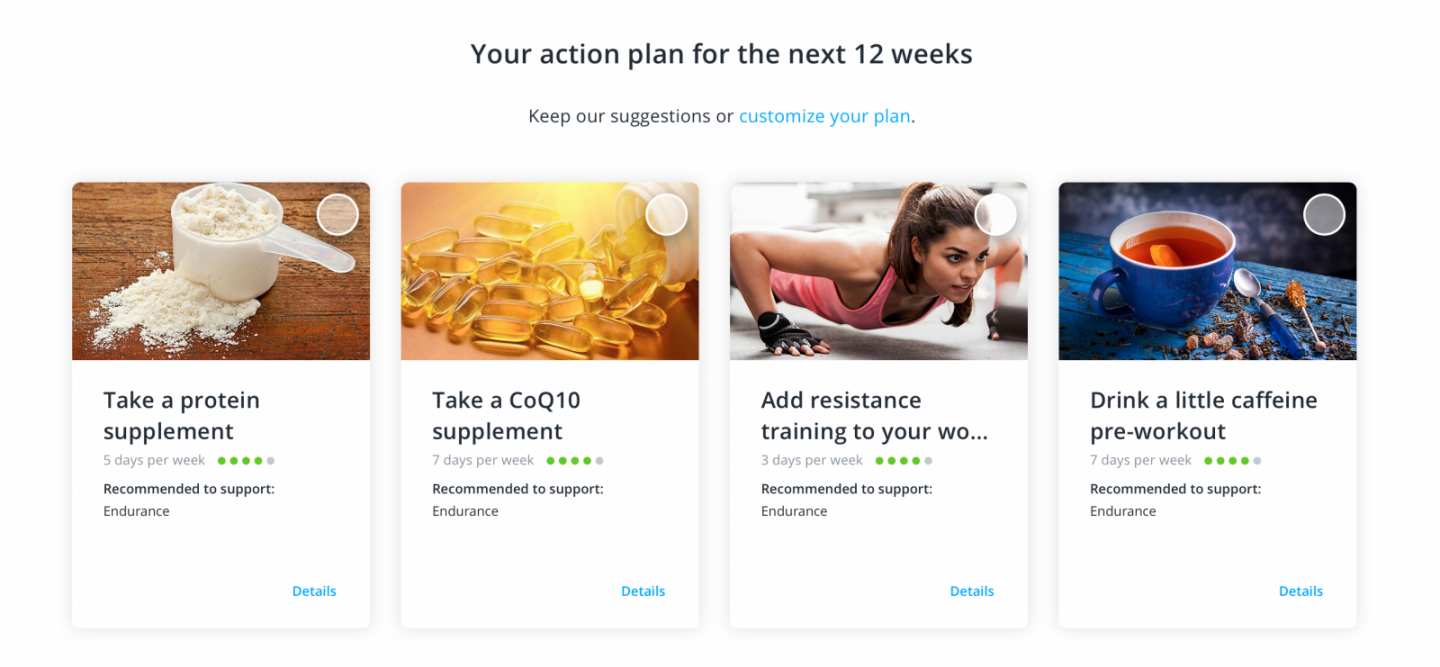
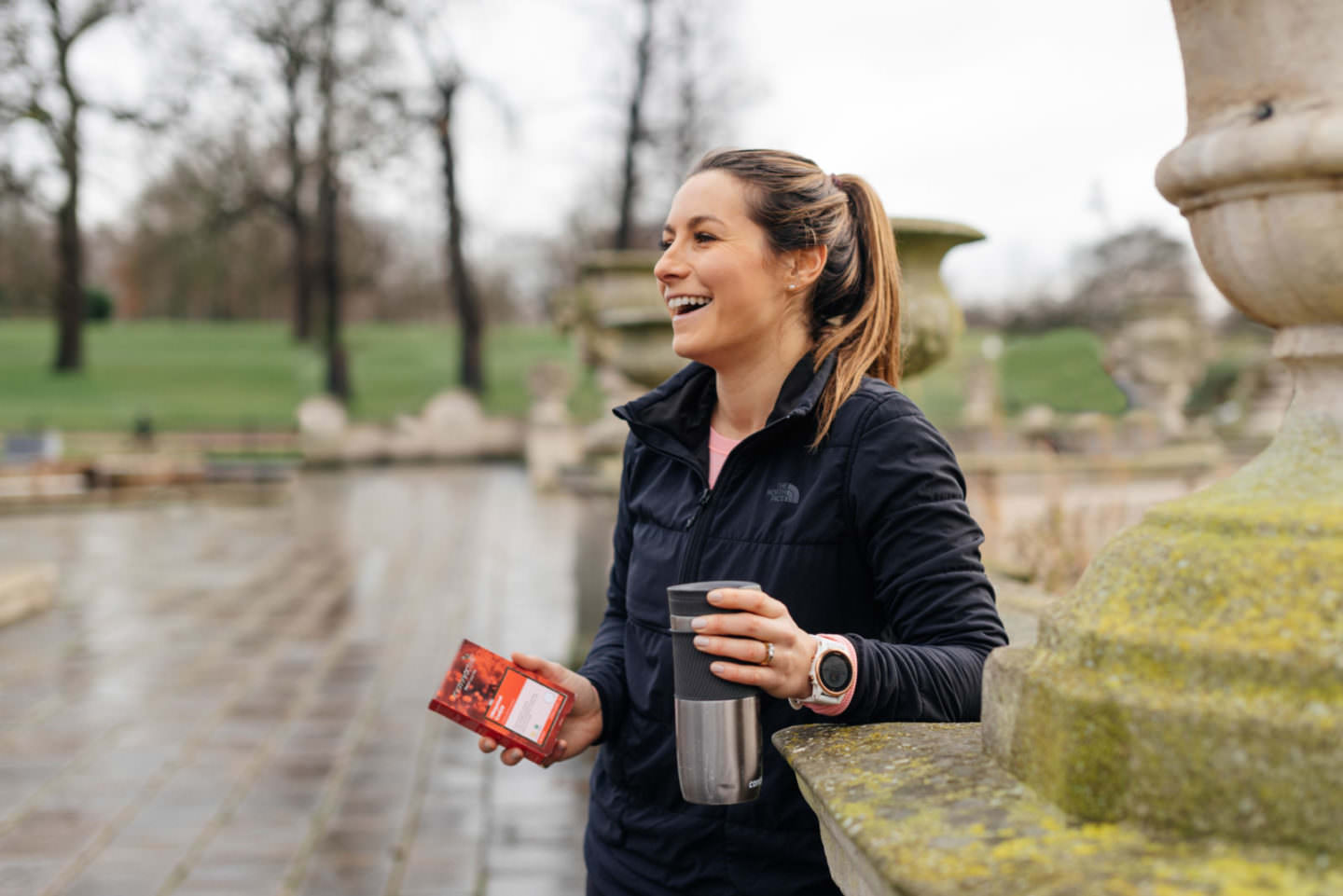
Really interesting to read, thank you for sharing.
Are you in Boston for the marathon? I’ll be there for it to cheer on the husband ?♂️?
I do think this is interesting. I think I go through periods of feeling more tired, but then teaching is a busy job so I do put it down to that usually. I think if I had some funds (and also felt brave because I am not good with needles and have had to have a lot of blood taken from me before and always faint) I would be interested to see things like this in more detail. After reading lots of research I have started taking a vitamin D supplement each day but I am not keen on taking loads of different ones.
Interesting to read. This is a similar blood panel to the one I have for my PCOS, but the graphic displays are cleaner. I hope you find their suggestions help your training
Great post! Running can cause different levels in blood. It’s new to me. I’ll get mine checked.